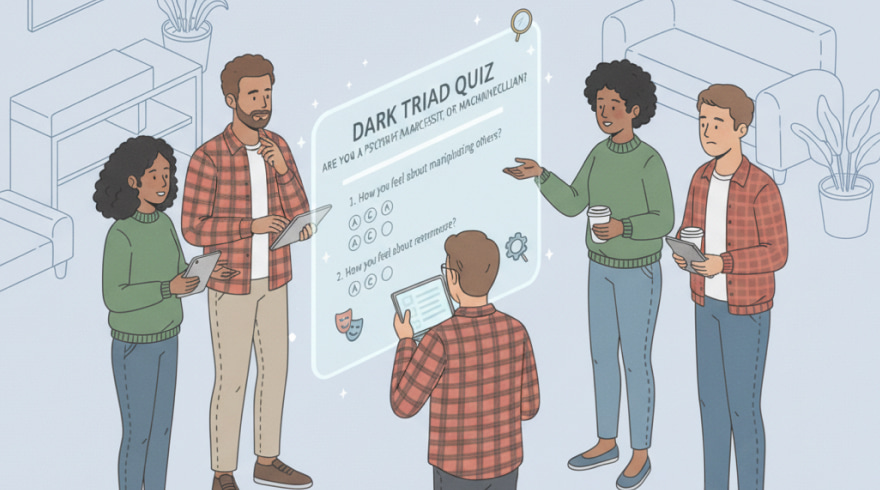The Guide to Narcissism Self-Assessments: Insights, Benefits, and Smart Next Steps
- 6 November 2025

What a Narcissism Quiz Measures and Why It Matters
Modern self-assessments aimed at narcissistic traits evaluate patterns like grandiosity, attention seeking, emotional empathy, entitlement, and boundary awareness. Rather than diagnosing, these instruments screen for tendencies that influence how a person relates, communicates, and responds to feedback. When taken thoughtfully, the process encourages reflection on motives behind behaviors such as bragging in subtle ways, reacting defensively to critique, or prioritizing image over connection. The real value lies in translating abstract qualities into plain-language indicators that any reader can recognize in daily life, from workplace dynamics to family interactions.
Used properly, results open the door to healthier habits, such as practicing perspective-taking, managing competitive impulses, or building tolerance for disappointment. Many people explore initial self-awareness with a free narcissist quiz to gauge patterns before considering deeper reading, coaching, or therapy. The most helpful approach is to treat scores as a springboard for growth rather than a definitive label. That mindset keeps curiosity high, reduces shame, and makes it easier to adopt actionable strategies based on what the questions revealed about stress triggers and interpersonal blind spots.
- Clarifies common traits without medical jargon, promoting accessible psychoeducation.
- Transforms vague concerns into concrete behaviors you can monitor and refine.
- Encourages constructive conversations about boundaries, validation, and empathy.
- Provides a baseline for tracking progress after practicing new communication skills.
- Helps differentiate confidence from grandiosity by focusing on impact, not intent.
How the Assessment Works: Items, Scales, and Interpreting Results
Most tools use short statements rated across a Likert scale (for example, from “strongly disagree” to “strongly agree”). Items cluster into domains such as admiration seeking, authority, superiority, vanity, and empathy gaps. Timed formats prevent overthinking, which keeps responses closer to instinctive reactions. After submission, you receive a numeric summary plus domain highlights that reveal strengths as well as potential trouble spots. Well-built questionnaires also share guidance on context, reminding readers that situational stress, culture, and role expectations can sway how traits appear.
Interpreting outcomes requires nuance, because elevated scores in one area do not automatically equal a pervasive pattern across life. Beyond simple yes/no items, a narcissist personality quiz typically organizes statements along dimensions like entitlement, exhibitionism, and empathy deficits to deliver a balanced snapshot. With that multidimensional view, you can explore targeted adjustments such as practicing active listening during disagreements or tempering public self-promotion with genuine appreciation of others’ contributions.
| Domain | What Elevated Responses Suggest | Reflection Prompt |
|---|---|---|
| Grandiosity | Inflated self-importance and status preoccupation | How often do I overstate wins to manage insecurity? |
| Admiration Seeking | Frequent validation checking and spotlight chasing | Can I request feedback without chasing praise? |
| Empathy Gaps | Difficulty attuning to others’ feelings or needs | What signals do I miss when I rush to defend myself? |
| Exploitativeness | Instrumental view of people and relationships | Do my goals ever eclipse fairness or reciprocity? |
To make results actionable, convert insights into micro-habits: pause before boasting, ask one clarifying question in every conflict, or practice credit-sharing at meetings. Small, repeated behaviors update self-concept more reliably than dramatic overhauls. Over time, those adjustments reduce friction, increase trust, and strengthen collaboration without diluting healthy ambition or drive.
Benefits, Ethics, and Best Practices for Using Self-Tests
Responsible self-assessment blends curiosity with humility. It is wise to view outcomes as informational, not determinative, and to remember that only qualified clinicians can diagnose complex personality patterns. Ethical use includes respecting privacy, avoiding weaponization of scores, and resisting the urge to label others. The healthiest stance is compassionate accountability: noticing where your behavior lands for other people, then choosing one or two skillful alternatives you can practice in real contexts this week.
Convenience matters, but quality and integrity matter more when selecting a tool. If budget is tight, directories and university labs sometimes list a narcissist quiz free option that still uses validated item banks for a credible starting point. Before you begin, look for clear disclaimers, strong reliability notes, and transparent scoring descriptions. After you finish, write a brief reflection on what surprised you, what felt accurate, and what you want to experiment with next. Treat that reflection as a personal contract that turns awareness into steady behavior change.
- Use results to guide experiments such as empathy drills, not as fixed identity labels.
- Combine self-reports with input from trusted peers to balance blind spots.
- Protect confidentiality; share only with people who will respond constructively.
- Reassess periodically to see whether new habits shift patterns over time.
- Seek professional support if traits cause significant distress or relationship strain.
Applying Insights in Relationships and Communication
Interpersonal friction often arises from mismatched needs for recognition, control, or emotional bandwidth. When you understand your own triggers, it becomes easier to pause, de-escalate, and choose empathy over defensiveness. If a partner or colleague seems preoccupied with image, you can set clear boundaries while still validating legitimate achievements. That balance, firm limits plus humane acknowledgment, reduces resentment without rewarding manipulative behavior.
When concerns involve friends or teammates, structured observation beats rumor or snap judgments. When you feel unsure about a peer’s behavior, an is my friend a narcissist quiz may help you structure observations without jumping to clinical labels. Whatever the outcome, prioritize practical steps: negotiate roles explicitly, define shared goals, and protect your energy by limiting cycles of criticism and counter-criticism. In heated moments, reframe the conversation toward impacts (“Here’s how that affected me”) rather than motives (“You only care about yourself”), which keeps dialogue specific and solvable.
- Replace assumptions with clear requests and measurable agreements.
- Use time-outs during escalations to prevent all-or-nothing reactions.
- Offer praise for cooperative behaviors to reinforce collaborative norms.
- Decline bait for admiration contests by refocusing on shared outcomes.
- Document boundaries in writing for consistency across future interactions.
FAQ: Common Questions About Narcissism Quizzes
Are these quizzes diagnostic tools?
No. They are educational screeners that translate psychological constructs into everyday language. Results highlight tendencies and patterns, not clinical conditions. Only licensed professionals can provide assessment, differential diagnosis, and treatment planning after a structured evaluation.
How accurate are online results?
Quality varies widely. Look for tools that cite reliability, validity, and item sources, and that offer domain-level feedback instead of a single score. Accuracy also depends on your honesty, current stress level, and whether you interpret results in context rather than as absolute truth.
What should I do after getting a high score?
Start small: practice perspective-taking, invite specific feedback, and reduce self-promotion in settings where it undermines trust. Track one behavior at a time for two weeks, then reassess. If traits create ongoing distress or conflict, consider consulting a clinician for personalized guidance.
Can I use a quiz to judge someone else?
It is better to use structured observations and respectful dialogue than to label others. Focus on concrete behaviors, shared agreements, and boundaries. If a relationship feels unsafe or chronically depleting, prioritize protection and support rather than armchair diagnosis.
How often should I retake an assessment?
Every two to three months is sufficient for most people, allowing time to implement new habits and see meaningful change. Retake sooner only if major life events shift your environment or stress levels significantly, which can temporarily alter how traits express.
Latest News
-
![Comprehensive Guide to Sociopathy Self-Assessments and Quizzes]()
- 10 November, 2025
-
![A Complete Guide to Understanding the Dark Triad Quiz]()
- 7 November, 2025
-
![Your Complete Guide to Assessing Dark Triad Traits Online]()
- 5 November, 2025



